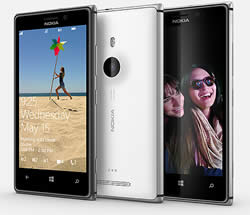Difference between Nokia Lumia 925 and HTC One X+
Key Difference: Nokia has recently announced its new flagship phone the Nokia Lumia 925. The phone comes with a 4.5-inch AMOLED capacitive touch screen which takes up a good amount of space on the front, with the speaker and sensors on the top. The 4.5-inch capacitive screen has the same PureMotion HD+, ClearBlack that is found in Lumia 920. The HTC One X+ sports a 4.7-inch super LCD 2 touch screen with approximately 312 ppi pixel density, meaning the screen is pretty awesome and it does not show any pixels. The device is powered by 1.7 GHz Quad-core NVIDIA Tegra 3 process making it faster than the original HTC One X.
 Nokia has recently announced its new flagship phone the Nokia Lumia 925. This phone is in lines with the other new Nokia Lumia 928, but differs from its cousin in many ways. The Nokia Lumia 925 was also known as “Catwalk” phone for a long time before it was officially announced. The company has maintained a similar design to its Lumia phones but has added a metal band. This is the first phone that will feature a mix of plastic and metal. However, the back is still made of polycarbonate plastic. The phone is made slim and light weight making it comfortable to hold. The phone’s frame is made of aluminum with only the back made of plastic. However, the back is non-removable so the battery is not easily accessible.
Nokia has recently announced its new flagship phone the Nokia Lumia 925. This phone is in lines with the other new Nokia Lumia 928, but differs from its cousin in many ways. The Nokia Lumia 925 was also known as “Catwalk” phone for a long time before it was officially announced. The company has maintained a similar design to its Lumia phones but has added a metal band. This is the first phone that will feature a mix of plastic and metal. However, the back is still made of polycarbonate plastic. The phone is made slim and light weight making it comfortable to hold. The phone’s frame is made of aluminum with only the back made of plastic. However, the back is non-removable so the battery is not easily accessible.
The device is available in black, white or grey, so don’t look for the bright colors that are expected of other Nokia phones. The phones comes with a 4.5-inch AMOLED capacitive touch screen which takes up a good amount of space on the front, with the speaker and sensors on the top and the three capacitive buttons (Home, Back and Menu) on the bottom. Similar to the other high-end Lumias, the top of the device holds audio jack, the microUSB port and the SIM slot. The left and the bottom side of the device is bare, while the right side has the volume rocker, the power button and the dedicated camera button making it a little too crowded.
The 4.5-inch capacitive screen has the same PureMotion HD+, ClearBlack that is found in Lumia 920. The ClearBlack technology plus the HD OLED screen offers sharp, clear images and also spectacular viewing in sunlight. The phones provides a good contrast and vibrant colors but the difference is not really that apparent when using day-to-day.
Under the hood, the phone is powered by Dual-core 1.5 GHz Krait Qualcomm MSM8960 Snapdragon, the same processor used in Lumia 920 and 928. The processor is fast and responsive, but lags when it comes to camera. The phone comes with Adreno 225 and 1 GB RAM, compared to the 2G found in its competitors. The phone comes with only 16 GB internal memory and does not offer users to extend it using an external card. The phone integrates the Windows Phone 8 OS, which works seamlessly. However, again similar to all other Windows Phones, the app stores lack many apps and still has yet to reach its potential.
The phone comes with an 8.7MP rear camera and a 1.3MP front camera. The camera comes with upgraded technology that uses a 1/3'' sensor size to take more high-res photos. The camera also comes with Nokia’s Smart Camera technology that allows taking 10 photos at once, which can then be altered to create the perfect photo. This is similar to the Zoe technology found on HTC One that takes mini videos along with photos. The company has also added an additional lens on the five-lens that allows taking much better photos. Nokia also boasts about its low-light imaging technology that allows users to take excellent photos in low-lighting conditions. The imaging technology is quite superior and does take excellent images with less blur. However, the camera shutter is quite slow which requires the user to hold the phone with a steady hand to eliminate motion blur.
The company also has removed the built-in wireless feature to cut down on the weight, but has added it as an option by purchasing the wireless cover. The phone comes with a non-removable Li-Ion 2000 mAh battery that allows the phone to go longer periods of time without requiring charging. The phone also comes with a few nifty features that make it stand out. The new phone is slick, thin and has decent features. It could just be phone that turns the tide in favor of Nokia Windows Phone.
 HTC is a popular smartphone company and has been touted for many beautifully designed phones. The phones are smart, sleek and to the point with no extra marketing gimmick. HTC maintains this with the launch of the HTC One X+. The HTC One X+ is a new phone that shares many similarities to its big brother the HTC One X; however, it also shines in many places where the predecessor shied. The HTC One X+ is basically an upgraded version of the HTC One X and hit the market in November 2012.
HTC is a popular smartphone company and has been touted for many beautifully designed phones. The phones are smart, sleek and to the point with no extra marketing gimmick. HTC maintains this with the launch of the HTC One X+. The HTC One X+ is a new phone that shares many similarities to its big brother the HTC One X; however, it also shines in many places where the predecessor shied. The HTC One X+ is basically an upgraded version of the HTC One X and hit the market in November 2012.
The HTC One X+ sports a 4.7-inch super LCD 2 touch screen with approximately 312 ppi pixel density, meaning the screen is pretty awesome and it does not show any pixels. The screen has excellent resolution and shows sharp and crisp clear photos and videos. The screen is protected by Corning Gorilla Glass 2 that keeps it from getting minor day-to-day scratches. The device is sleek and thin in general, but has put on a little extra weight (5 grams) compared to the original One X. The phone is covered in a soft-touch polycarbonate plastic chassis that has smooth curved corners. The soft matte plastic makes it easy to grip the phone and keeps it from slipping through the fingers. The phone comes incorporated with the HTC Sense UI v4+, which is basically a combination of the HTC Sense and Jelly Bean. The combination of the two provides additional features such as: Google Now, Voice search, faster screen navigation, new gallery app (organizes photos by events and location) and HTC Get Started (allows PC to configure the phone faster).
The device is powered by 1.7 GHz Quad-core NVIDIA Tegra 3 process making it faster than the original HTC One X. The faster processor allows seamless transitions between apps and makes the device smooth to work with. There was no hindering or jerking when operating the device. The One X+ comes installed with Android v4.1 (Jelly Bean) right out of the box. The device comes with 32 and 64 GB internal storage capacity that is not expandable and 1 GB RAM.
The device houses an 8 MP rear camera with auto focus, LED flash, and BSI sensor, along with a 1.6 MP front camera for video conferencing. The front camera also has a countdown features that counts down to the moment the picture is being taken to ensure that the user is camera ready. The camera comes with many additional features that help the phone stand out against all the other devices. The features include: F2.0 aperture and 28mm lens, Dedicated HTC ImageChip, VideoPic, Continuous shooting, Smart Flash, Sightseeing mode, Video stabilization, Slow motion video capture and playback and ImageSense. The ImageSense allows the phone to take faster and the best photos under any lighting. The VideoPic is a new feature that allows users to take images while recording a video as well as taking an image when playing an already recorded video. The Smart Flash provides five levels of flash that adjust automatically when trying to take a shot, while the Sightseeing mode allows the camera to be handy during outings, so that it can be easily accessible.
The device houses a non-removable 2100 mAh Lithium-ion Polymer battery, which according to tests by many review website, dies pretty quickly. When fully-working the battery does not even last a whole day. However, no official data has been released by the company regarding the Talk-time and the Stand-by time. The company has also added the Beats Audio sound enhancement to its speakers as well as headset and it can be turned on and off by the user. The phone has been a popular hit with many that require a good sturdy budgeted phone with an excellent camera.
The information for the detailed table about the two phones has been taken from the Nokia website, HTC website and GSMArena.com.
|
|
Nokia Lumia 925 |
HTC One X+ |
|
Launch Date |
June 2013 |
November 2012 |
|
Company |
Nokia |
HTC |
|
Size |
129 x 70.6 x 8.5 mm |
134.36 x 69.9 x 8.9mm |
|
Display |
4.5 inches AMOLED capacitive touchscreen |
4.7 inch super LCD 2 touch screen |
|
Screen |
768 x 1280 pixels (~334 ppi pixel density), 16M colors |
720 x 1280 pixels (~312 ppi pixel density) |
|
Protection |
Corning Gorilla Glass 2 |
Corning Gorilla Glass 2 |
|
Weight |
139 grams |
135 grams |
|
2G Network |
GSM 850 / 900 / 1800 / 1900 |
GSM 850 / 900 / 1800 / 1900 |
|
3G Network |
HSDPA 850 / 900 / 1900 / 2100 - RM-892, RM-893 HSDPA 850 / 900 / 1700 / 1900 / 2100 - RM-910 |
HSDPA 850 / 900 / 1900 / 2100 HSDPA 850 / 1900 / 2100 - for AT&T |
|
4G Network |
LTE 800 / 900 / 1800 / 2100 / 2600 - RM-892 LTE 700 / 1700 / 2100 - RM-893 |
LTE 700 MHz Class 17 / 1700 / 2100 - for AT&T |
|
GUI |
Windows Phone 8 |
HTC Sense UI v4+ |
|
CPU speed |
Dual-core 1.5 GHz Krait |
1.7 GHz Quad-core NVIDIA® Tegra® 3 |
|
GPU |
Adreno 225 |
ULP GeForce 2 |
|
OS |
Windows Phone 8 |
Android OS, v4.1.1 (Jelly Bean) |
|
Chipset |
Qualcomm MSM8960 Snapdragon |
NVIDIA Tegra 3 AP37 |
|
RAM |
1 GB |
1 GB |
|
SIM Size |
microSIM |
microSIM |
|
Internal Memory |
16 GB |
32/64 GB |
|
Expandable Memory |
N/A |
No |
|
Sensors |
Ambient light sensor, Accelerometer, Gyroscope, Proximity sensor, Magnetometer, Orientation sensor |
Gyro sensor, G-Sensor, Digital compass, Proximity sensor, Ambient light sensor |
|
Connectivity |
SIM, microUSB, 3.5mm audio, USB, Bluetooth, Wi-Fi, NFC, Wi-Fi Channel bonding |
3.5 mm stereo audio jack, NFC capable, Compliant with Bluetooth 4.0, Bluetooth with aptX™ enabled, Wi-Fi®: IEEE 802.11 a/b/g/n, DLNA®, micro-USB 2.0 (5-pin) port with mobile high-definition video link (MHL) for USB or HDMI connection |
|
Data |
GPRS, EDGE, WLAN, Bluetooth, NFC and USB. |
GPRS, EDGE, WLAN, Bluetooth, NFC, USB. |
|
Speed |
HSDPA, 42.2 Mbps; HSUPA, 5.76 Mbps; LTE, Cat3, 50 Mbps UL, 100 Mbps DL |
HSDPA, 21 Mbps; HSUPA, 5.76 Mbps - Global version / HSDPA, 42 Mbps; HSUPA, 5.76 Mbps; LTE |
|
WLAN |
WLAN IEEE 802.11 a/b/g/n |
Wi-Fi 802.11 a/b/g/n, dual-band, DLNA, Wi-Fi hotspot |
|
Bluetooth |
Bluetooth v3.0 with A2DP; Object Push profile (OPP) 1.1, Hands-free profile (HFP) 1.5, Advanced Audio Distribution Profile (A2DP) 1.2, Audio/Video Remote Control Profile (AVRCP) 1.4, Phone Book Access Profile (PBAP) 1.1 |
Bluetooth v4.0 with A2DP |
|
USB |
microUSB v2.0 |
microUSB v2.0 (MHL) |
|
Primary Camera |
8.7 MP, 3264 x 2448 pixels |
8 MP camera with auto focus, LED flash, and BSI sensor |
|
Secondary Camera |
1.3 MP, 720p@30fps |
1.6 megapixel front camera (720p for video recording) |
|
Video |
1080p@30fps, video stabilization |
1080p HD video recording |
|
Camera Features |
|
|
|
Sound Enhancement |
Dolby Headphone sound enhancement Active noise cancellation with dedicated mic |
Beats Audio |
|
Audio supported formats |
ASF, MP4, AAC, AMR, MP3, M4A, WMA, 3GP, 3G2 |
.aac, .amr, .ogg, .m4a, .mid, .mp3, .wav, .wma |
|
Video supported formats |
MP4, WMV, AVI, 3GP, 3G2, M4V, MOV |
.3gp, .3g2, .mp4, .wmv (Windows Media Video 9), .avi (MP4 ASP and MP3) |
|
Battery Capacity |
Non-removable Li-Ion 2000 mAh battery (BL-4YW) |
Non-removable 2100 mAh Li-ion Polymer battery |
|
Talktime |
2G: 18 hours 3G: 12 hours |
No official data released |
|
Standby Time |
3G: 440 hours |
No official data released |
|
Available Colors |
Black, White, Gray |
Black, White |
|
Messaging |
SMS (threaded view), MMS, Email, Push Email, IM |
SMS(threaded view), MMS, Email, Push Mail, IM, RSS |
|
Browser |
HTML5 |
HTML5, Adobe Flash |
|
Radio |
FM radio |
Stereo FM radio with RDS |
|
GPS |
GPS with A-GPS support and GLONASS |
GPS with A-GPS support and GLONASS |
|
Java |
N/A |
Java with Java MIDP emulator |
|
Additional Features |
|
|
Image Courtesy: nokia.com, htc.com









Add new comment